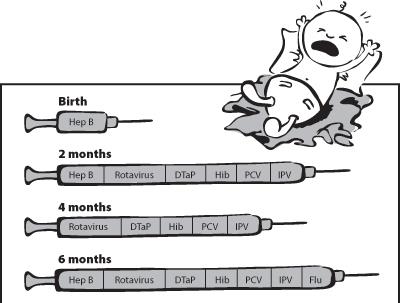Babies with poor resistance are very susceptible to infectious diseases and vaccination is the safest way to protect them. Immunizations help prevent the spread of disease and help protect children and babies from dangerous complications. Currently, vaccinations can protect babies against 12 dangerous diseases
content
How do vaccines work?
Why should remember vaccination schedule for babies?
Vaccinations for babies and children mothers need to remember
Things to keep in mind when vaccinating children

For your child's health, do not miss the following vaccinations!
How do vaccines work?
When bacteria or viruses enter the body, they attack and spread themselves everywhere. The invasion of bacteria makes the baby sick. Then, the body's immune system works to fight off the viruses that cause disease. Once your body repels the disease-causing virus, your body will create cells that recognize and fight off disease in the future. Vaccines work on a similar mechanism.

Increasing the resistance for your baby with massage Regular and proper massage will help strengthen and adjust the digestive system, help blood circulation, complete the circulatory system and develop the immature respiratory system of the child.
Vaccines help strengthen the body's immune system by mimicking the mechanism of "infection", but not causing illness in the baby. It only causes the immune system to develop corresponding responses to be able to recognize and prevent disease. Therefore, after a vaccination, some babies may experience a mild fever. This symptom is quite normal. Mom don't need to worry too much!
Why should remember vaccination schedule for babies?
Adequate vaccination of the newborn baby will stimulate the development of the baby's immune system, helping to prevent and limit the infectiousness of many pathogens.
Compared with some of the side effects of unwanted vaccinations, compared with some of the side effects of unwanted vaccinations, the risk of not vaccinating infants far exceeds many times, according to experts. Therefore, vaccination is the simplest and most effective way to protect your baby from death, disability and dangerous complications of many dangerous children's diseases .
Whether it is service vaccination or vaccination in the ward, it is advisable to keep in mind the vaccination schedule for infants and young children. If you forget, you can consult the expanded vaccination schedule in the nearest ward where you live or look up the following information:
Vaccinations for babies and children mothers need to remember
Postpartum: Within 24 hours of birth, babies will be vaccinated against hepatitis B.
Under 1 month of age: BCG vaccination, tuberculosis prevention
The shots are given to babies 2 to 6 months of age
Vaccination Diphtheria, Pertussis, Tetanus, Nasal polio 1,2,3
Hepatitis B nose 2,3,4
Vaccination of Hib nose 1,2,3
Rotavirus vaccine: prevents Rota virus that causes diarrhea
6-11 months: Get a flu shot

Childhood vaccination from an expert perspective. Childhood vaccination is the primary concern of parents. In fact, the proportion of children who are fully vaccinated as recommended only accounts for a part, because there exists a parallel opinion "when needed, then vaccinate".
Vaccinations for babies 12 months to 15 months:
Japanese B encephalitis
Chicken pox
Measles, Mumps, Rubella
Hepatitis A nasal 1
16-23 months:
Diphtheria, Pertussis, Tetanus, Nasal polio 4
Hib nose 4
Hepatitis B nose 4
Hepatitis A nose 2
The shots for babies over 2 years old (24 months)
Prevention of Meningococcal A + C
Japanese encephalitis nose 3
Prevention of rhinitis, meningitis caused by pneumococcal bacteria
Vaccination for typhoid, diapers
Over 9 years: HPV vaccine: prevents cervical cancer and genital warts.
Things to keep in mind when vaccinating children
Do not feed your baby too full or too hungry before vaccination.
Have good personal hygiene to limit the risk of infection
Bring the medical record and inform the health staff in advance about your baby's health status as well as chronic diseases, birth defects, history of allergy, especially your baby's reactions to other vaccinations. .
Live vaccines such as tuberculosis, chickenpox ... should be vaccinated at least 4 weeks apart.














